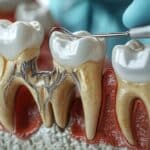If you are in the process of losing or have lost about half of your teeth, or have advanced periodontal disease, you may be eligible for a full mouth dental implant procedure. Your remaining teeth will be extracted, and full arches will be affixed to four or more implants placed throughout your jaw.
If you are losing or have lost only a few teeth, however, you may be better suited with individual implants and crowns.
Those with healthy teeth seeking a more attractive smile are generally not eligible for a dental implant procedure and may be encouraged to seek out braces or veneers. Though dental implants strongly resemble natural teeth in appearance and function, an oral surgeon will not consider them to be a superior solution to healthy, natural teeth.
Dental Implant Eligibility Complications
There may be complications that require further discussion with your doctor to discern if a full mouth dental implant procedure is right for you. None of the following factors automatically disqualify you as a dental implant candidate, but may impact your procedure location, date, or success rate.
Pregnancy – Full mouth dental implant procedures often utilize General Anesthesia during the surgery. Studies have suggested that anesthesia may have a slight correlation with miscarriage, premature birth, and low birth weight in infants. If dental implant surgery is considered essential and time-sensitive, the second trimester is generally the safest time to undergo anesthesia. If the surgery can be reasonably postponed, your doctor may recommend waiting until after delivery to perform the procedure.
Smoking – Cigarette smoke can harm or block salivary glands. Saliva is needed to fight harmful bacteria, and a lack of saliva increases your risk of infection in the jawbone or gums that support the implants. Nicotine restricts the flow of oxygen and blood to your bone and weakens the immune system. It also inhibits the osseointegration process of the implants fusing to your natural bone. Smokers are at greater risk of implant failure and are recommended to quit smoking at least 2 weeks before the procedure. They should also abstain for at least 6 months after the procedure to allow for the implants to heal successfully.
Chemotherapy – Jawbone can lose density due to chemotherapy. Implants placed in bone without adequate density are at higher risk of failure. If you have a history of chemotherapy in jaw/neck/maxillofacial regions, you will need an oral surgeon or your oncologist to take a CT scan to assess your bone density and determine eligibility.
Medical Conditions – Conditions such as heart disease, stroke, diabetes, and auto-immune diseases all affect the jawbone’s ability to fuse with the implant and protect against infection. Patients with these conditions may also be considered high risk while under General Anesthesia. If you have two or three major health problems present, you may be required to have your dental implant procedure performed in a hospital to better monitor your vitals during and after surgery.
Bone Loss – Moderate bone loss in the jaw usually isn’t problematic for full mouth dental implant procedures. This is because full arches of prosthetic teeth only require four or more implants for support. Surgeons generally only need to locate four to six pockets of dense bone to successfully place implants.
In cases of severe bone loss in the upper jaw, zygomatic implants can be placed to fuse with the zygoma (cheekbone) for support. However, few surgeons are skilled in the placement of zygomatic implants. Depending on your location, you may need to travel to be treated by a zygomatic implant specialist.
Determining Your Eligibility for Full Mouth Dental Implants
Ultimately, your eligibility for dental implants should be determined by a qualified oral surgeon. With that said, don’t hesitate to get multiple opinions from different surgeons. We find that many patients are told by other surgeons they are ineligible for implants or will need a bone grafting procedure due to bone loss in the jaw. Later, they come to our dental clinic and are successfully treated with zygomatic implants, without need for bone grafting.
Overall, the success rate for full mouth dental implant procedures is above 99% and is one of the most safe and predictable procedures in dentistry. Dental implants provide patients with improved health, confidence, and quality of life. Book a consultation with a qualified oral surgeon to see if they’re right for you. Most likely, they are!









